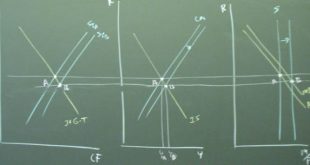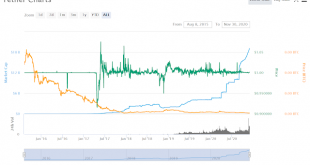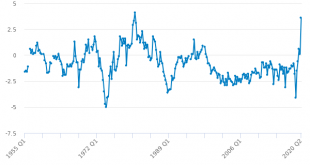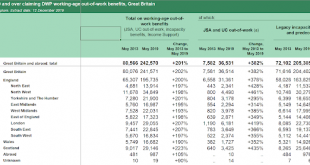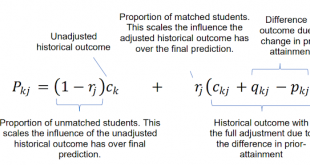This post was sparked by conversations with people who have opposing views of how money creation works. Some people think that classical models such as IS-LM don't work with endogenous money theory, therefore the models need to be discarded: others think that there's nothing wrong with the model and the problem is endogenous money theory. Personally I think that simple models like IS-LM can be powerful tools to explain aspects of the working of a market economy, and it behooves us therefore...
Read More »The asymmetric mechanics of Tether
Tether is the issuer of the cryptocurrrency world's premier stablecoin, USDT. Stablecoins aim to guarantee the value of cryptocurrencies in dollar terms, hedging volatility risk and making it easier to realise notional gains from cryptocurrency's wild price rises. But Tether's relationship with the main cryptocurrencies, particularly Bitcoin, is controversial. There is a raging battle between those who think that USDT issuance pumps up the price of Bitcoin, and those who argue that USDT...
Read More »The asymmetric mechanics of Tether
Tether is the issuer of the cryptocurrrency world's premier stablecoin, USDT. Stablecoins aim to guarantee the value of cryptocurrencies in dollar terms, hedging volatility risk and making it easier to realise notional gains from cryptocurrency's wild price rises. But Tether's relationship with the main cryptocurrencies, particularly Bitcoin, is controversial. There is a raging battle between those who think that USDT issuance pumps up the price of Bitcoin, and those who argue that USDT...
Read More »Trade, saving and an economic disaster
The UK is running a trade surplus. No, really, I am not joking. This is from the ONS's latest trade statistics release:The UK total trade surplus, excluding non-monetary gold and other precious metals, increased £3.8 billion to £7.7 billion in the three months to August 2020, as exports grew by £21.4 billion and imports grew by a lesser £17.5 billionIt's the first time the UK has run a trade surplus since the late 1990s: And if you were thinking this was because of the lockdown, you would...
Read More »Trade, saving and an economic disaster
The UK is running a trade surplus. No, really, I am not joking. This is from the ONS's latest trade statistics release:The UK total trade surplus, excluding non-monetary gold and other precious metals, increased £3.8 billion to £7.7 billion in the three months to August 2020, as exports grew by £21.4 billion and imports grew by a lesser £17.5 billionIt's the first time the UK has run a trade surplus since the late 1990s: And if you were thinking this was because of the lockdown, you would...
Read More »A Financial View of Labour Markets
We are used to thinking of workers as free agents who sell their labour in a market place. They bid a price, companies offer a lower price and the market clearing rate is somewhere between the two. Free market economics, pure and simple. But actually that's not quite right. The financial motivations of workers and companies are entirely different. To a worker, the financial benefit from getting a job is an income stream, which can be ended by either side at any time. But to a company, a...
Read More »A Financial View of Labour Markets
We are used to thinking of workers as free agents who sell their labour in a market place. They bid a price, companies offer a lower price and the market clearing rate is somewhere between the two. Free market economics, pure and simple. But actually that's not quite right. The financial motivations of workers and companies are entirely different. To a worker, the financial benefit from getting a job is an income stream, which can be ended by either side at any time. But to a company, a...
Read More »Statistics for state pension age campaigners
Another day, another takedown of claims made by women's state pension age campaigners. This time, it's figures for benefit claims by women in their early 60s. David Hencke claims that sharp rises in the number of women in this age group claiming unfit-for-work benefits (ESA and legacy incapacity benefits) proves that losing their state pension entitlement is wrecking the health of women in this age group. And he argues that this calls into question the DWP's recent victory in the Court of...
Read More »Statistics for state pension age campaigners
Another day, another takedown of claims made by women's state pension age campaigners. This time, it's figures for benefit claims by women in their early 60s. David Hencke claims that sharp rises in the number of women in this age group claiming unfit-for-work benefits (ESA and legacy incapacity benefits) proves that losing their state pension entitlement is wrecking the health of women in this age group. And he argues that this calls into question the DWP's recent victory in the Court of...
Read More »The inhumanity of Ofqual’s algorithm
To everyone's relief, the Government eventually caved in over the awarding of grades to A/AS level and GCSE students who had not been able to take their exams. The algorithm that awarded aspiring young people grades they did not expect and did not deserve was discarded in favour of grades set by their schools and colleges. But only if the grades awarded were too low. Those to whom the algorithm awarded over-high grades got to keep them. As a result, the rampant "grade inflation" that the...
Read More » Francis Coppola
Francis Coppola

